MercoPress. South Atlantic News Agency
Tag: Guyana
-
Tuesday, January 2nd 2024 - 10:34 UTC
UK, Guyana mocking Venezuela, Maduro warns

In a year-ending interview with Le Monde Diplomatique's Ignacio Ramonet, Venezuelan President Nicolás Maduro said his Guyanese counterpart Irfaan Ali was mocking his country and other regional multilateral organizations who sponsored the St Vincent and the Grenadines understanding whereby the dispute over the oil-rich Essequibo area would not escalate.
-
Saturday, December 30th 2023 - 10:38 UTC
UK says Venezuela's military maneuvers “unjustified”
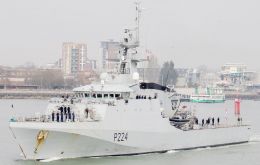
The United Kingdom said Venezuelan President Nicolàs Maduro's decision to up his country's military readiness over the Essequibo dispute with Guyana was “unjustified.” The Bolivarian forces deployed over 5,000 troops in response to the arrival in the area of the Royal Navy's HMS Trent.
-
Friday, December 29th 2023 - 10:45 UTC
Essequibo crisis: Venezuela launches defensive military operation
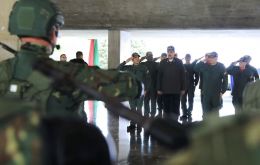
Venezuelan President Nicolás Maduro ordered preventive measures be taken as the Royal Navy's HMS Trent was reaching the area to side with Guyana amid tensions over the disputed oil-rich Essequibo area.
-
Wednesday, December 20th 2023 - 09:55 UTC
Essequibo conflict means higher insurance costs for Guyana
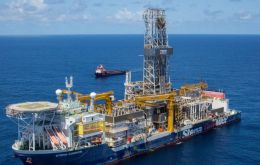
Amid escalating concerns about the Essequibo crisis with neighboring Venezuela, Guyana has been included in the list of greatest risk for maritime transport drafted by insurers Lloyd's Market Association for vessels visiting offshore facilities in the former British colony's Exclusive Economic Zone, beyond “territorial waters.”
-
Tuesday, December 19th 2023 - 10:54 UTC
Rutley meets with Ali to reaffirm UK's support to Guyana in Essequibo controversy
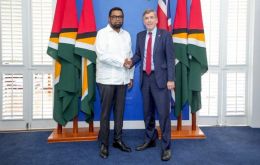
British Minister for the Americas, Caribbean, and Overseas Territories David Rutley met Monday in Georgetown with Guyanese President Irfaan Ali to reaffirm the United Kingdom's support to the South American country in their controversy with Venezuela over the 160,000 km2 oil-rich Essequibo region.
-
Friday, December 15th 2023 - 10:32 UTC
Venezuela and Guyana not to use force over Essequibo dispute

Presidents Nicolás Maduro of Venezuela and Irfaan Ali of Guyana agreed Thursday in St. Vincent and the Grenadines not to threaten each other or use force in any circumstances. The 11-topic understanding was reached in the first round of talks brokered by host Prime Minister Ralph Gonsalves as president pro-tempore of the Community of Latin American and Caribbean States (Celac).
-
Thursday, December 14th 2023 - 12:07 UTC
Can Brazil stop Venezuela from invading Guyana?
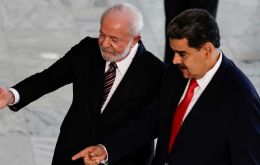
By Thiago de Aragão (*) The Brazilian government, eager to assert itself as South America’s preeminent power, finds itself at a crossroads. The victory of libertarian opportunist Javier Milei in Argentina’s recent presidential election has added a new element of uncertainty to Brazil’s relationship with its southern neighbor.
-
Tuesday, December 12th 2023 - 10:22 UTC
Presidents of Venezuela and Guyana prepare for Thursday's talks

Venezuelan President Nicolás Maduro insisted Monday that next Thursday's talks in St Vicent and the Grenadines between him and his Guyanese colleague Irfaan Ali were the direct result of the Dec. 3 referendum and, hence, an achievement of the Venezuelan people.
-
Tuesday, December 12th 2023 - 10:13 UTC
Essequibo conflict: Brazil sending observer to Maduro-Ali meeting
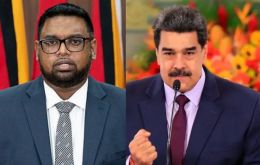
The Brazilian Government of President Luiz Inácio Lula a Silva shall be sending a delegation headed by former Foreign Minister and current presidential advisor on international affairs Celso Amorim to Thursday's meeting between the leaders of Guyana and Venezuelan in St Vincent and the Grenadines to discuss the Guiana Essequiba issue, it was reported in Brasilia.
-
Saturday, December 9th 2023 - 10:26 UTC
Essequibo: Guyanese president hopes Maduro will not act recklessly

Guyanese President Irfaan Ali said that Venezuela's latest actions regarding the dispute over the Guaiana Essequiba were “a regional threat” and hoped Nicolás Maduro's regime would not act “in an adventurous and very irresponsible manner.”
